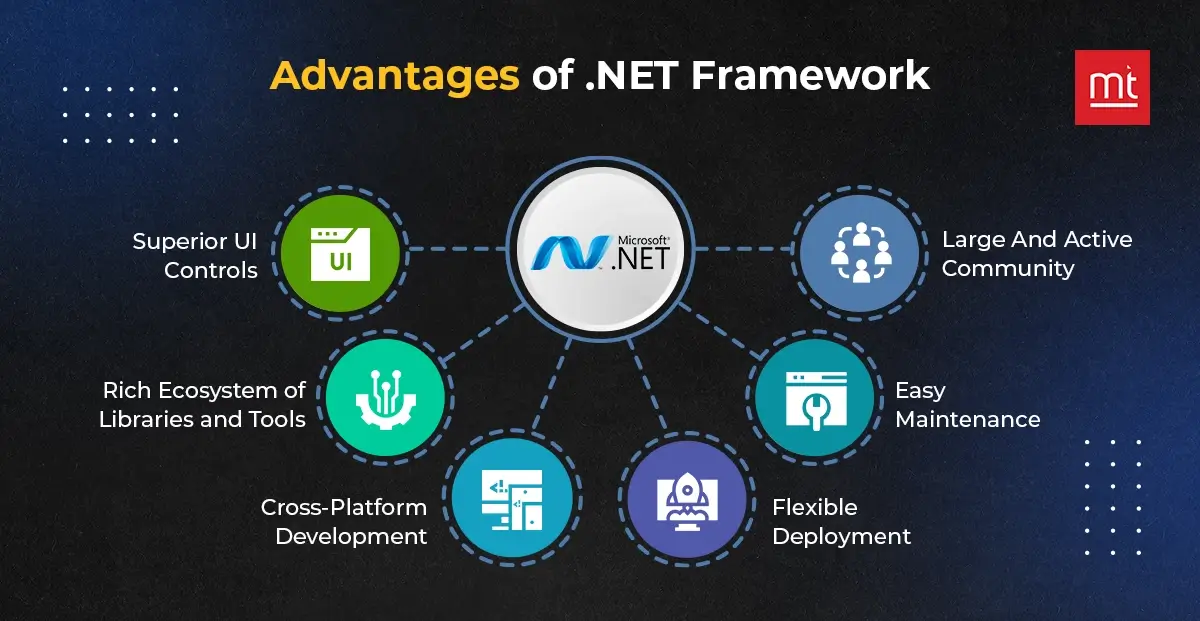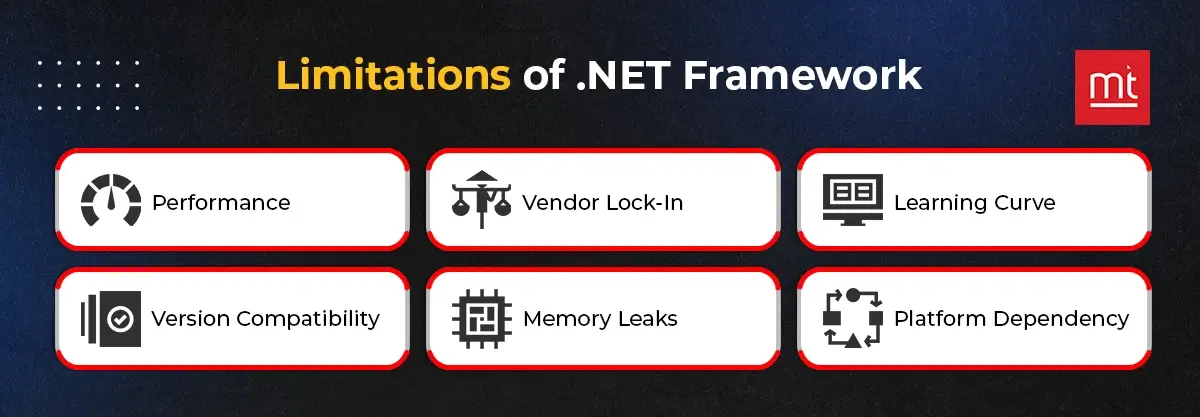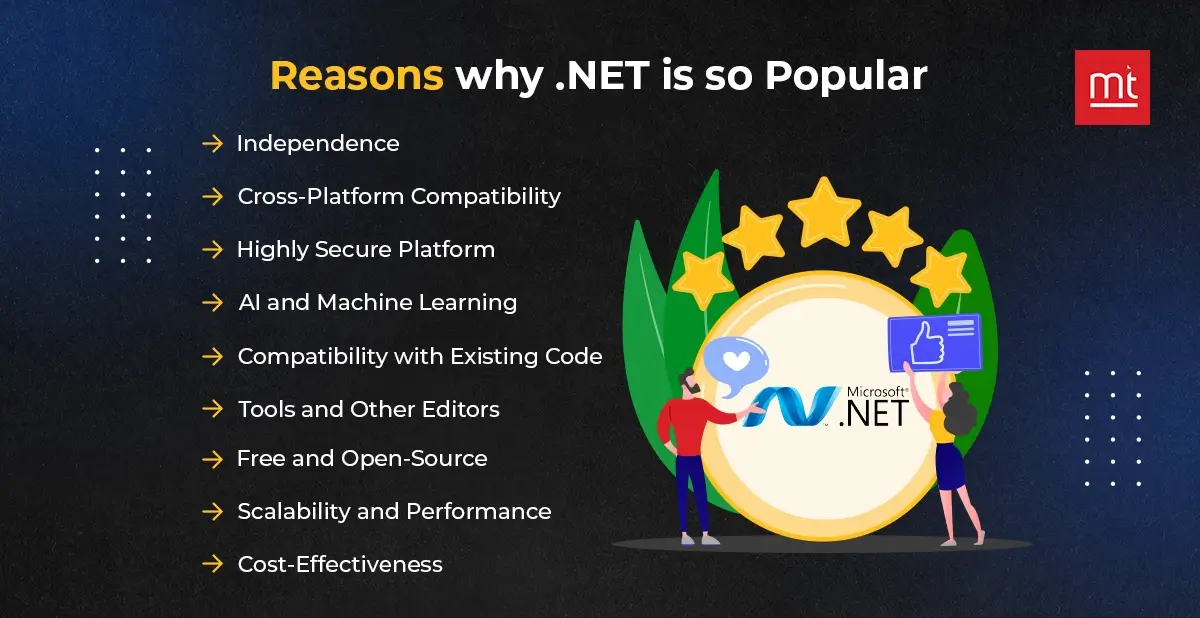Introduction:
Digitalization is the new normal among businesses. You will never outshine your competitors if you don't have a sound digital presence. Also, millennials have new expectations from the brands they deal with! They don't want good products or services; they want a sense of gratification from brands.
In addition to that, they also want a satisfied digital journey while dealing with brands online. For example, if a website or app does not offer a good user experience, people will abandon it and switch to the next search on Google search results.
For developers, it is a very challenging job to build software, websites, and mobile apps that stand out from the crowd. They have to fight on multiple fronts to ensure that the solution is future-ready, feature-rich and meets the demands and expectations of the target audience.
Choosing the proper framework is vital for any business to start its software development process. Dot Net, powered by Microsoft, is one of the most thriving software development frameworks. Web and mobile apps made with .NET development excel in all the departments like features, functionalities, performance, speed, etc. .NET mobile and web applications can help skyrocket your revenues and offer your audience a highly satisfying user experience.
Since its inception, .NET has been the first choice among developers to build scalable web and mobile applications. We will discuss why .NET is so popular among all web app development frameworks available in 2025.
There are a total of 5,278,984 live websites made with ASP.NET.
Furthermore, 34.2% of the total websites and web apps are running on the .NET framework.

What is the .NET Framework?
.NET is a free, open-source web and mobile app development framework to build feature-rich applications. Microsoft powers .NET and is one of the top-notch web application development frameworks supported by a massive community of .NET developers. The .NET framework comprises various development tools and programming languages to build next-gen web and mobile applications.
Developers can use C#, F#, C++, or Visual Basic programming languages to write .NET applications. You can create desktop, web, and mobile applications with ASP.NET. It is a versatile and flexible framework that helps developers build user-centric applications that stand the test of time.
Furthermore,.NET also has cross-platform development capabilities and is widely used in building cloud-based solutions. With .NET, developers can have ready-made tools to simplify the software development process. ASP.NET is a part of the .NET framework used to create web applications.
The main component of the .NET framework is the common language runtime, also called CLR. It is a web or software environment that manages everything during development. For example, the CLR environment helps developers execute code in various programming languages, such as .NET C#, NET VB.NET, and .NET F#. With CLR, developers can choose the correct programming language for the project based on requirements and scalability goals.
Also, .NET has an extensive class library that makes things easy for developers. The library saves developers time using pre-built code for everyday tasks across various programming languages. With .NET, developers can build applications that offer consistent performances on multiple platforms, like Windows, Linux, and macOS. .NET's core advancements make it a preferred choice among developers.
Evolution of .NET Framework
Since its inception, .NET has been the most updated framework, with regular releases and updated versions. The basic .NET 1.0 framework version was released in 2002 by Microsoft, and since then, a total of 11 updated versions have been released. The latest version was released in 2019.
On the other hand, the latest .NET 8 core version was released in 2023 with some significant improvements, like Blazor web UI unification and JSON enhancements to build data-driven, performance-oriented applications.
The latest .NET versions offer improved performance, cross-platform support, and a high level of modularity. Furthermore, Blazer's instructions allow developers to build single-page applications with rich, intuitive, and impressive UIs. Also, .NET supports cloud-native development and microservices architecture. With such integrations with cloud platforms, .NET applications can be accessed remotely through multiple devices, offering better collaboration and scalability.
Advantages of .NET Framework

1. Superior UI Controls
The best thing about .NET is that it offers superior user interface control. Not just that, the .NET framework also supports third-party UI controls. You can use various controls, like drag and drop, to build apps with highly impressive and user-friendly UIs.
2. Rich Ecosystem of Libraries and Tools
The .NET framework facilitates developers with a wide range of development tools and pre-built libraries to simplify and quick development. Developers can use these tools and libraries to quicken up the development process and perform tasks like data access, UI development, and networking.
3. Cross-platform Development
Though .NET is primarily designed for Windows, developers can use it as a cross-platform application development framework to run applications on other platforms, like macOS and Linux. They can use tools like Xamarin to build cross-platform apps.
4. Flexible Deployment
The .NET framework allows developers to deploy apps in multiple ways, like standalone executables, web apps, and cloud-based services. Only some other frameworks offer such flexibility in app deployment.
5. Easy Maintenance
.NET applications are easy to maintain and manage. These apps are made with modular design and robust tooling, so developers can easily maintain them without any hassles.
6. Large And Active Community
This is the best part of using .NET for your web or mobile app development project. A large community of developers contributes to it regarding various resources, tutorials, documentation, etc.
Limitations of .NET Framework

1. Performance
Though .NET is known for its performance, there might be some performance bottlenecks as it is a heavy-weight framework. You need to evaluate your performance requirements before you choose the framework for your project. If performance is the main issue, you can use lightweight frameworks.
2. Vendor Lock-In
Microsoft powers Vendor Lock-In .NET so that you might face vendor lock-in issues. If you want more flexibility and platform independence, look for another framework.
3. Learning Curve
You will need to hire experienced developers who are well-versed with the .NET framework. As it has a steeper learning curve, you must choose your team carefully. Hire .NET developers who have prior experience in object-oriented programming.
4. Version Compatibility
If a new .NET version is released, you might find it challenging to migrate your existing app to the new version. You will need careful planning and strategy to make it happen.
5. Memory Leaks
Some .NET applications might face memory leak issues due to poor memory management. Developers can use memory profiling tools to avoid such happenings.
6. Platform Dependency
Though .NET supports cross-platform app development, you should not forget that it was made primarily for Windows environments. Though the framework is making strides in cross-platform development, some deployment issues remain for non-Windows systems like macOS and Linux.
Reasons why .NET is so popular
Why should you go for .NET development? We have discussed why .NET is still popular and relevant in 2025.

#1. Independence
With .NET, you can make any type of application. Whether you want to build a web app, mobile app, single-page app, or desktop app, etc. Such independence makes .NET one of the developers' favourite frameworks. Also, developers can develop cross-platform apps with .NET that can run seamlessly on various operating systems, like Linux, Android, iOS, and macOS.
#2. Cross-platform compatibility
One of the reasons why .NET is still relevant and popular is that it can be used to build cross-platform apps. Writing once and running anywhere is the philosophy of cross-platform app development. Startups can save time and cost by using .NET to build cross-platform apps to reach a large target audience.
#3. Highly secure platform
.NET is one of the most secure app development frameworks, as Microsoft powers it. Security is one of the most significant concerns amongst businesses and developers. However, with .NET, they don't need to worry about security. With features like authorization, code access security, etc., .NET is a highly secure framework. Also, with MVC architecture, developers can build highly scalable and secure web and mobile applications.
#4. AI and Machine Learning
Artificial Intelligence and Machine Learning are emerging technologies integrated into mobile and web applications to offer immersive user experiences. .NET can help businesses incorporate ML models into applications with the open-source ML framework called ML.NET. Businesses understand the importance of AI and ML in the dynamic business landscape, and .NET can help in this transition.
#5. Compatibility with existing code
.NET can also quickly and seamlessly work with pre-existing code. So, if you want to update your legacy applications or programs, it is highly convenient with .NET. You can safeguard your investments, and you don't need to build apps from scratch, as you can use pre-existing code to write new web or mobile apps.
#6. Tools and other editors
.NET has many IDEs that help developers build feature-rich web and mobile apps. They can use these IDEs with Microsoft Visual Studio. It allows developers to add advanced features and functionalities to web applications, making them more competent and excellent. However, you will need a team of experienced .NET developers who can work with C#.
#7. Free and Open-Source
The .NET framework is a free and open-source web app development framework since its inception. Its open-source nature makes it one of the most popular frameworks. Developers can cater to all the client requirements with .NET. They can easily integrate custom components and APIs into the app without technical issues. Also, open-source frameworks are known for offering unparalleled customization possibilities.
#8. Scalability and performance
.NET applications are highly scalable and offer superior performance. .NET apps provide consistent performance across all operating systems and devices. Whether you have developed a mobile app or a website, you will find them running seamlessly on devices.
Furthermore, Microsoft keeps releasing the newest versions of its architecture to ensure that all functions are executed seamlessly and quickly. Even during high-traffic hours, you can expect a seamless and quick performance.
#9. Cost-effectiveness
Compared to other frameworks, .NET development is highly cost-effective as it is open-source and free. Furthermore, cross-platform compatibility makes it an ideal framework to build multiple apps for various operating systems. With features like containerization with Docker and Kubernetes and cloud computing, you can reduce infrastructure costs by a significant margin.
Is .NET The Right Choice for Startups?
- For small businesses and startups, .NET is the proper framework to build web or mobile apps.
- First of all, .NET app development is cost-effective compared to other frameworks.
- Thanks to robust libraries, IDEs, and other frameworks, you can expect quick app development that reduces the time-to-market for the app.
- No other framework offers scalability like the .NET framework. If you have scalability goals, .NET is the answer for you.
- Maintaining .NET applications does not need a fortune. .NET apps are easy to maintain, update, and manage.
Conclusion
The Microsoft-powered .NET framework is one of the most preferred frameworks to build web and mobile applications. It is a free, open-source framework that allows developers to build highly customised solutions. Furthermore, it is a highly flexible and versatile framework enabling developers to create user-centric apps. .NET development saves time, cost, and effort, thanks to robust libraries and other development tools.
.NET supports cross-platform app development, making it an ideal choice for startups and small businesses. You can build highly customised, user-centric, and feature-rich web and mobile apps that are highly scalable and secure.
In short, the popularity of the .NET framework will undoubtedly increase in the future, and we can see a steady rise in .NET applications.

About Author
Subscribe to Our Newsletter!
Join us to stay updated with our latest blog updates, marketing tips, service tips, trends, news and announcements!


![How Much Does It Cost to Build a Mobile App? [Checklist]](https://www.manektech.com/storage/blog/image/1708005911.webp)

![How Much Does It Cost to Develop a Website in 2024? [Checklist]](https://www.manektech.com/storage/blog/image/1700562973.webp)















